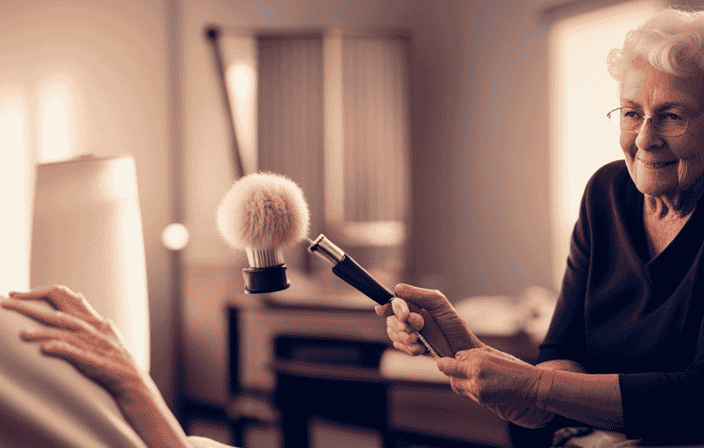Imagine a world where confusion and frustration consume your every thought. Where simple tasks become overwhelming and communication becomes a distant memory. This is the reality for those living with Alzheimer’s disease, a condition that often manifests in agitation and aggression.
But there is hope. In this article, we will explore effective strategies to calm these behaviors and bring peace to the lives of those affected by Alzheimer’s. From music therapy to pet companionship, we will uncover the power of compassion and evidence-based interventions in soothing the storm within.
Key Takeaways
- The stages of Alzheimer’s disease include mild, moderate, and severe, with each stage presenting different symptoms of agitation and aggression.
- Strategies such as music therapy, aromatherapy, physical touch, and pet therapy can be effective in calming agitation and reducing aggression in older adults with Alzheimer’s.
- Creating a positive first impression through a calm and open approach, placing the patient in a supportive community, maintaining routines, and regular medical check-ups are important in managing agitation and aggression.
- Early intervention is crucial in preventing the escalation of aggression, and seeking advice from experts and consulting a doctor is necessary, especially if aggression becomes violent and unmanageable.
Stages of Alzheimer’s
In the earlier stages of Alzheimer’s, I may experience mild memory loss, difficulty focusing, wandering, and difficulty handling objects. These symptoms can be frustrating and confusing, but it’s important to remember that they are a part of the disease.
As the disease progresses to the moderate stage, memory loss becomes more pronounced, daily tasks become challenging, and communication difficulties arise. It’s during this stage that aggression may also increase. Lack of sleep, changes in behavior, and repetition of behaviors are common.
In the severe stage, I will become totally dependent on my caregiver, lose the ability to communicate, and have limited mobility. Understanding the stages of Alzheimer’s can help caregivers and loved ones provide the appropriate support and intervention at each stage.
Dealing with symptoms
Dealing with the symptoms, I have found that maintaining a consistent routine helps me feel more independent and comfortable. Alzheimer’s disease progresses through three stages, each with its own set of challenges. In the mild stage, I may experience mild memory loss and difficulty focusing. As the disease progresses to the moderate stage, memory loss becomes more pronounced, daily tasks become more challenging, and communication difficulties arise. Aggression and agitation may also increase during this stage. In the severe stage, I become completely dependent on my caregiver, lose the ability to communicate, and experience limited mobility. To manage these symptoms, I have found various strategies to be effective. Music therapy has a soothing effect and helps calm agitation. Aromatherapy with scents like lavender can improve sleep and reduce hallucinations. Physical touch from my caregiver creates trust and reduces aggression. The presence of a pet provides physical activity and distraction, increasing joy and reducing aggression. These strategies, along with a positive first impression from caregivers, a supportive care community, and regular medical check-ups, have helped me navigate the challenges of Alzheimer’s with more ease and comfort.
| Strategies to Calm Agitation and Aggression |
|---|
| 1. Music therapy: soothing effects of music |
| 2. Aromatherapy: pleasant scents like lavender |
| 3. Physical touch: gentle touch from caregiver |
| 4. Pet therapy: presence of a pet |
| 5. Positive first impression: calm and open approach, pleasing facial expressions |
Creating a positive environment
To create a positive environment, I focus on maintaining a consistent routine and surrounding myself with supportive caregivers and a care community.
Having a routine helps me feel independent and comfortable. It gives me a sense of control and stability in my daily life.
I also find it important to have caregivers who approach me with calmness and openness. Their pleasing facial expressions and gentle touch make me feel safe and trusted.
Being in a supportive care community further reduces triggers for my aggressive behavior. It provides me with a sense of belonging and understanding.
Regular medical check-ups are crucial too, as they help identify any underlying health issues that may contribute to my agitation and aggression.
By implementing these strategies, I can create a positive environment that promotes my well-being and helps me manage my Alzheimer’s symptoms effectively.
Importance of early intervention
Early intervention is crucial in preventing the escalation of aggressive behavior, and seeking advice from experts is always advisable. When it comes to dealing with agitation and aggression in older adults with Alzheimer’s, taking action early on can make a significant difference in their well-being and the well-being of their caregivers.
Here are some effective strategies for early intervention:
-
Regular medical check-ups: Checking for any underlying health issues that may be contributing to the aggression is important. This can help identify any potential triggers and allow for appropriate treatment.
-
Medication management: Consulting with a healthcare professional about medication options can help alleviate symptoms of aggression and agitation.
-
Behavioral therapy: Engaging in behavioral therapy can provide valuable techniques and strategies for managing and redirecting aggressive behaviors.
-
Caregiver support: Seeking support from caregiver support groups or counseling services can provide valuable insight and guidance on how to effectively manage aggression and reduce caregiver stress.
-
Safety measures: Implementing safety measures, such as removing potentially harmful objects or creating a calm environment, can help prevent any potential harm during episodes of aggression.
By taking these steps, caregivers can provide the best possible care for their loved ones with Alzheimer’s and ensure a safe and peaceful environment for everyone involved.
Consulting a doctor
Consulting a doctor is essential in order to address any potential underlying health issues that may be contributing to the challenges faced by older adults with Alzheimer’s. Agitation and aggression in Alzheimer’s patients can sometimes be caused by physical discomfort, pain, or medication side effects.
A doctor can conduct a thorough evaluation to identify any medical conditions that may be exacerbating these behaviors. They can also review the patient’s current medications and make adjustments if necessary. In addition, a doctor can provide guidance on appropriate interventions and strategies to manage agitation and aggression, such as prescribing medication if needed or recommending alternative therapies.
It is important to consult with a healthcare professional who specializes in Alzheimer’s and behavioral management to ensure the best possible care for the individual.
Seeking advice from experts
I should seek advice from experts to better understand how to manage the challenges faced by older adults with Alzheimer’s. Their expertise can provide valuable insights and strategies for effectively dealing with agitation and aggression in these individuals.
Here are three reasons why seeking advice from experts is crucial:
-
Specialized knowledge: Experts in Alzheimer’s care have extensive experience and training in managing the unique symptoms and behaviors associated with the disease. They can offer valuable guidance on how to approach and respond to aggression in a way that promotes safety and well-being.
-
Individualized recommendations: Each person with Alzheimer’s is unique, and what works for one individual may not work for another. Experts can assess the specific needs and circumstances of the older adult and provide tailored advice and interventions to address their specific challenges.
-
Emotional support: Caring for a loved one with Alzheimer’s can be emotionally challenging. Experts can provide much-needed emotional support, guidance, and reassurance to family members and caregivers, helping them navigate the complex emotions and stress that can arise in these situations.
By seeking advice from experts, we can enhance our understanding and approach, ultimately improving the quality of care and well-being for older adults with Alzheimer’s.
Related posts
Based on my research, I came across some related posts that might provide additional insights and information on managing challenges faced by older adults with Alzheimer’s. These posts can offer different perspectives and strategies that may complement the methods we have discussed so far. Here are a few examples:
| Post Title | Description |
|---|---|
| "10 Best Therapy Toys for Adults" | This post explores different types of therapy toys that can be beneficial for older adults with Alzheimer’s. It discusses how these toys can help stimulate cognitive function, provide sensory experiences, and promote relaxation and engagement. |
| "How To Calm Down From A Panic Attack" | Although not specific to Alzheimer’s, this post offers techniques for managing anxiety and panic attacks. It provides step-by-step instructions on deep breathing exercises, grounding techniques, and self-soothing strategies, which can be useful for both caregivers and individuals with Alzheimer’s. |
| "Calm Little Minds: The Power of Meditation for Kids" | While targeted towards children, this post highlights the benefits of meditation in promoting calmness and reducing stress. It emphasizes the importance of mindfulness and relaxation techniques, which can also be applied to older adults with Alzheimer’s. |
Exploring these related posts can provide additional ideas and approaches to effectively calm agitation and aggression in older adults with Alzheimer’s.
Exploring additional perspectives can provide valuable insights into managing challenges faced by older adults with Alzheimer’s. When it comes to calming agitation and aggression in Alzheimer’s patients, there are several effective strategies to consider:
-
Cognitive stimulation therapy: Engaging patients in activities that stimulate their cognitive abilities can help reduce aggression and improve overall well-being.
-
Communication techniques: Learning effective communication strategies, such as using simple language, maintaining eye contact, and speaking slowly and calmly, can help defuse potentially aggressive situations.
-
Environmental modifications: Creating a calm and soothing environment by reducing noise levels, providing comfortable seating, and using soft lighting can help alleviate agitation and aggression.
-
Medication management: In some cases, medication may be necessary to manage severe agitation and aggression. Consulting with a healthcare professional is essential to ensure the appropriate use of medications.
By incorporating these strategies into the care plan, caregivers can create a more peaceful and supportive environment for older adults with Alzheimer’s, ultimately enhancing their quality of life.
Frequently Asked Questions
What are some alternative therapies that can help calm agitation and aggression in older adults with Alzheimer’s?
Some alternative therapies that can help calm agitation and aggression in older adults with Alzheimer’s include music therapy, aromatherapy, physical touch, and pet therapy. These therapies have been shown to have soothing effects and reduce aggressive behaviors.
Are there any specific scents or essential oils that are recommended for aromatherapy in Alzheimer’s patients?
Yes, lavender is a commonly recommended scent for aromatherapy in Alzheimer’s patients. Studies have shown that it can improve sleep and reduce hallucinations, helping to calm agitation and aggression.
How can caregivers effectively use physical touch to reduce aggression and increase trust in Alzheimer’s patients?
To effectively use physical touch to reduce aggression and increase trust in Alzheimer’s patients, caregivers should provide gentle touch and reassurance. Research shows that physical touch can help to calm agitation and create a sense of comfort and security.
Are there any specific types of pets that are more effective in reducing aggression and increasing joy in Alzheimer’s patients?
In my research, I found no specific evidence suggesting that certain pets are more effective in reducing aggression and increasing joy in Alzheimer’s patients. However, the presence of any pet can provide physical activity and distraction, which may help in calming agitation and increasing happiness.
What are some additional strategies that can be used to create a positive first impression for Alzheimer’s patients?
Creating a positive first impression for Alzheimer’s patients involves using a calm and open approach, maintaining routines, placing them in a supportive community, and ensuring regular medical check-ups. These strategies can help reduce triggers for aggression and promote a sense of independence and comfort.
Conclusion
In conclusion, as a caregiver for a loved one with Alzheimer’s, it is crucial to implement effective strategies to calm agitation and aggression. By creating a positive environment, using music therapy, aromatherapy, and physical touch, we can help our loved ones find peace and reduce their symptoms.
Early intervention and seeking advice from experts are essential to prevent the escalation of aggressive behavior. Remember, regular medical check-ups are vital for identifying underlying health issues.
Here’s an interesting statistic: Did you know that 90% of individuals with Alzheimer’s experience behavioral and psychological symptoms?
Let’s work together to provide the care and support our loved ones deserve.









